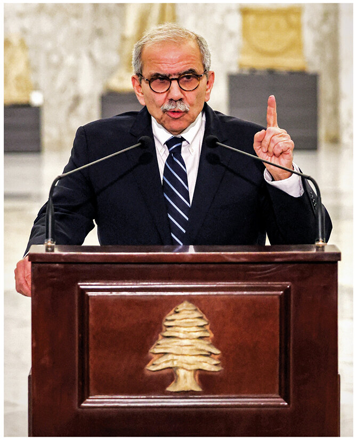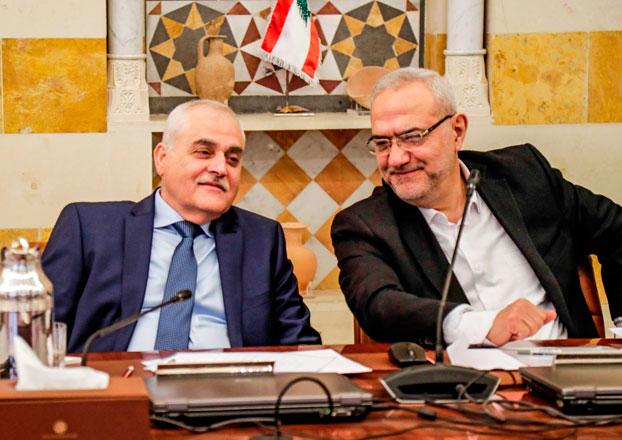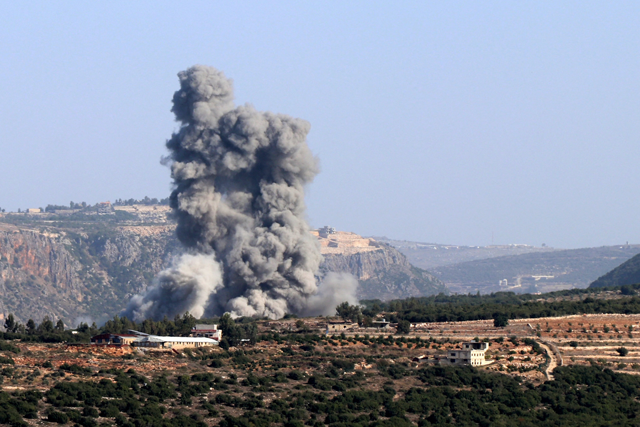You are here
Hizbollah backs new Lebanese government ahead of confidence vote
By AFP - Feb 26,2025 - Last updated at Feb 27,2025

Lebanese Prime Minister Nawaf Salam (AFP photo)
BEIRUT, Lebanon — Hizbollah's parliamentary bloc on Tuesday gave its support to Lebanon's new government, which in a ministerial statement ahead of a confidence vote vowed a state monopoly on arms and the country's neutrality.
"We give our confidence to the government," said Mohammed Raad, the head of Hizbollah's parliamentary bloc, expressing hope the new administration would "succeed in opening the doors to real rescue for the country".
"We are keen on cooperating to the greatest extent to preserve national sovereignty and its stability and achieve reforms and take the state forward," Raad told a two-day parliamentary session that began on Tuesday and will culminate in a vote of confidence in the new government.
Hizbollah, once the country's most powerful military and political force, suffered major setbacks in more than a year of hostilities with Israel including two months of all-out war, including an Israeli ground invasion, that halted with a November 27 ceasefire.
Israel killed a slew of senior commanders including the group's longtime chief Hassan Nasrallah and pounded the group's strongholds in the country's south and east and in Beirut's southern suburbs.
The ministerial statement, an outline of the new government's work plan that was read out by Prime Minister Nawaf Salam, vowed to extend "state sovereignty across all its territories exclusively with its own forces".
It also committed to deploy the army "in internationally recognised Lebanese border areas", and emphasised the need to work to implement a commitment by Lebanese President Joseph Aoun on "the state's duty in monopolising the bearing of weapons" and "deciding on war and peace".
Hizbollah was the only faction to keep its weapons after the Lebanese civil war, using them to fight the Israeli occupation of south Lebanon that ended in 2000. It also fought a major war with Israel in 2006.
'Make Lebanon neutral'
The ministerial statement noted the need to take "all the necessary steps to liberate all Lebanese territories from Israeli occupation".
Israel has maintained its troops in five "strategic" points along the shared border despite the ceasefire deal requiring its forces to withdraw completely.
Raad said the aim of the latest war was "to finish with Hizbollah... and end its resistance presence" against Israel, adding, "That attempt failed".
The new government has pledged to create a fund for rebuilding damaged and destroyed areas and is hoping for foreign assistance with the reconstruction effort, with the country mired in a five-year economic crisis.
The ministerial statement also pledged to adopt a "foreign policy that works to make Lebanon neutral from axis conflicts" and ensure "Lebanon is not used as a platform for attacking" Arab and friendly countries.
Hizbollah has been a key player in Iran's so-called "axis of resistance" against Israel and the United States.
A number of Arab states including Saudi Arabia have for years accused Hizbollah of having too much control over Lebanese politics and being involved in activities that threatened their countries' security.
Related Articles
BEIRUT — Hizbollah's bigger role in Lebanon's new unity government points to a growing appetite to shape state affairs and builds on unprece
BEIRUT — Lebanon's Iran-backed Hizbollah movement said on Thursday that five of its fighters, including the son of a senior lawmaker, had be
BEIRUT — A Lebanese minister whose remarks on Yemen's war sparked a row with Gulf Arab states said on Friday he would consider resigning if
















